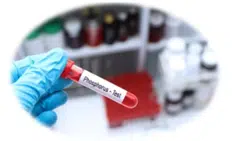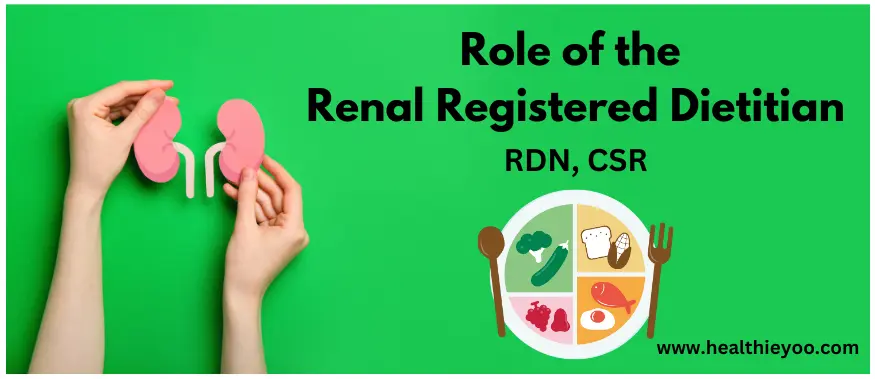Here is the role of the renal registered dietitian and registered dietitian nutritionist (RDN) with a board certification as a certified specialist in renal nutrition (CSR).
To understand what a renal dietitian does, it’s important to first know what dietitians do.
Registered Dietitian Nutritionist (RDN)
Registered Dietitian Nutritionists (RDNs) are healthcare professionals trained to provide dietary guidance to support the prevention and treatment of disease and nutrient deficiencies. RDN’s assist the public in many ways including:
- Creating and analyzing restaurant menus
- Creating therapeutic meal plans for weight loss
- Participating in public policy surrounding government-recommended diet guidelines
Clinical RDN’s work in healthcare facilities such as hospitals, rehabilitation facilities, nursing homes, bariatric centers, primary care healthcare hubs, dialysis clinics, and diabetes centers. As such, it is necessary for the RDN to work closely with medical doctors and the rest of the healthcare team to ensure the success of any nutrition interventions. The clinical RDN typically has a specialization by board certification. The board certification for the renal dietitian is “Certified Specialist in Renal Nutrition” or CSR.
The Renal RD (Registered Dietitian) Explained
Renal dietitians specialize in the nutritional needs of people with chronic kidney disease (CKD) and end-stage renal disease (ESRD). People in this population have unique nutritional needs that are determined by a person’s decline in kidney function as well as any other existing medical condition. People with a diagnosis of CKD stage 3 through 5 generally need the guidance of a renal RDN to ensure they know how to make necessary adjustments to their diet to help manage their overall health.
Dietitians know that food is not just meant to keep you healthy. Food is also a source of enjoyment and connection with culture and religious practice. The RD can help identify replacement foods when necessary and help with recipes on how to best preserve food traditions while maintaining optimal health.
Finding The Right Balance
There are many changing health factors throughout life for someone who is not living with a chronic disease. For people living with CKD, this is no different and the changes may be more pronounced. For example, weight gain or weight loss may become an issue depending on the extent of damage to the kidneys. For example, someone with significant damage may be producing less urine than they used to or none. For this reason, a person with CKD may need to consume less fluid than they used to since their body is not excreting all of it to maintain fluid balance. Diuretics may be prescribed to help stimulate the kidneys to release more urine. Finding the right balance of these medications can be challenging especially if they are not taken at regular intervals.

Weight gain or loss may also be due to a variety of reasons including:
- Decreased appetite as a side effect of a buildup of toxins in the blood (uremia)
- Decreased appetite due to depression resulting from the disease
- Decreased appetite due to abdominal swelling and/or associated constipation
- Increased appetite due to stress or depressive factors
- Increased appetite due as a side effect of certain steroidal medications
As you can see, there are several reasons why a person with CKD would benefit from diet counseling. Renal dietitians are experts in helping patients navigate their food choices to obtain the right mix of macro (protein, carbohydrate, and fat) and micro (vitamin and minerals) nutrients. Diabetes is prevalent among those living with CKD. As such, the RD can address any need to improve blood sugar levels which can often be higher than the goal for different reasons related to kidney disease.
Nearly all patients with later-stage CKD have high blood pressure resulting either from pre-existing conditions or the progression of the disease. As a result, the RD can advise on how to best keep blood pressure within normal limits. RD’s offer the level of help needed whether it’s designing a menu or providing food lists to choose from. Patients are always in the driver’s seat when working with an RD as everyone has their own skill set and desired pace.

The High's and Low's
One significant role of the renal registered dietitian (RD) is to help manage electrolytes including calcium, phosphorus, and potassium in the blood. Due to the nature of the disease, these lab values can become abnormally high or low. By recommending diet changes, supplements, and some medications, these lab values can be maintained in a normal range. Maintaining these and other labs within normal limits is the best way to slow the progression of kidney disease and other health problems that can result from ESRD.
It’s important to recognize that no one person with CKD has the same struggles or severity of disease. For this reason, the RD will approach each patient with a different lens depending on his/her health dynamics. Nearly all people living with CKD have some degree of mineral bone disease (MBD). MBD occurs when there is an imbalance between calcium and phosphorus due to abnormal hormone regulation. Without appropriate diet and medication interventions, MBD can progress to many health problems, many of which can cause permanent disability.
For example, a person with high phosphorus levels over time can experience damage to blood vessels which can lead to restricted circulation. Over time, this condition can cause permanent loss of vision, the need for amputations, heart attack, and stroke. By monitoring labs closely and making proper recommendations, renal dietitians assist patients in maintaining a good quality of life.

What to expect when meeting a renal dietitian (RDN, CSR)
Meeting with a renal RD for the first time is usually the same as meeting with any other RD. It starts with a discussion about past medical and medication history. The RD will also want to know about a person’s nutrition history including any supplement use and cultural practices that influence his/her food choices. One of the most significant parts of this inquiry is to evaluate a person’s gastrointestinal (GI) function. GI function is how well a person can chew, swallow, digest, and excrete. This type of information is meant to help the RD complete a nutrition assessment. The assessment serves as a baseline measure as well as a guide for future food and nutrition recommendations. Sometimes, RD’s will recommend an appetite stimulant medication for patients with very poor appetite. This is something that a medical doctor would prescribe. They may also recommend appropriate natural remedies such as probiotics to improve gut function.
Persons living with CKD can expect to have labs drawn at least quarterly by their nephrologist. If on dialysis, a person can expect to have their labs drawn monthly. The renal RD will review these labs for any abnormalities and trends so that nutrition and medication recommendations can be therapeutic. Many people with CKD have caregivers who may assist them with everything from grocery shopping to food preparation. Dietitians work with caregivers by educating them on what changes, if any, need to be made. Sometimes, the RD may ask the patient and/or caregiver to keep a written record (food diary) over a few days to determine if there is anything that may be contributing to an abnormal lab result.

Reaching Success
Managing day-to-day life with CKD has its challenges. Renal RD’s can help by providing the right tools and help explore which strategies work best for the patient. Health “success” is defined as a mutual agreement between the patient and the healthcare team. Although maintaining nutrition-related lab values within normal limits is the best way to slow disease progression, it is not always a predictor of health or longevity. Normal lab values are also not the sole contributor to a good quality of life. Having a good support system is necessary to ensure people living with CKD can obtain the needed resources such as transportation to doctor visits, picking up medications, grocery shopping, and food preparation. Emotional support is also essential to help manage the stress that patients can experience related to their disease.
The renal dietitian supports patients by providing the following:
- Education on lab values and what is necessary to keep them within normal limits
- Diet strategies to support optimal bone and cardiovascular health
- Recommendations for food and medication supplements
- Assist with applications for assistance programs to obtain free or discounted medications
- Suggestions on community resources to obtain food
- Referrals to other specialists for enhanced therapy and treatment
- Referrals to social workers to assist with financial-related barriers
- Coaching on lifestyle factors that impact overall health
Renal RD’s are an important and integral part of the healthcare team. For more information on this topic:
Eatright.org
Kidney.org

Cheryl Robinson
Related Posts

Nutritional needs for bone marrow transplant recovery

Renal Dietitian Answers Real Questions Of Dialysis Patients





